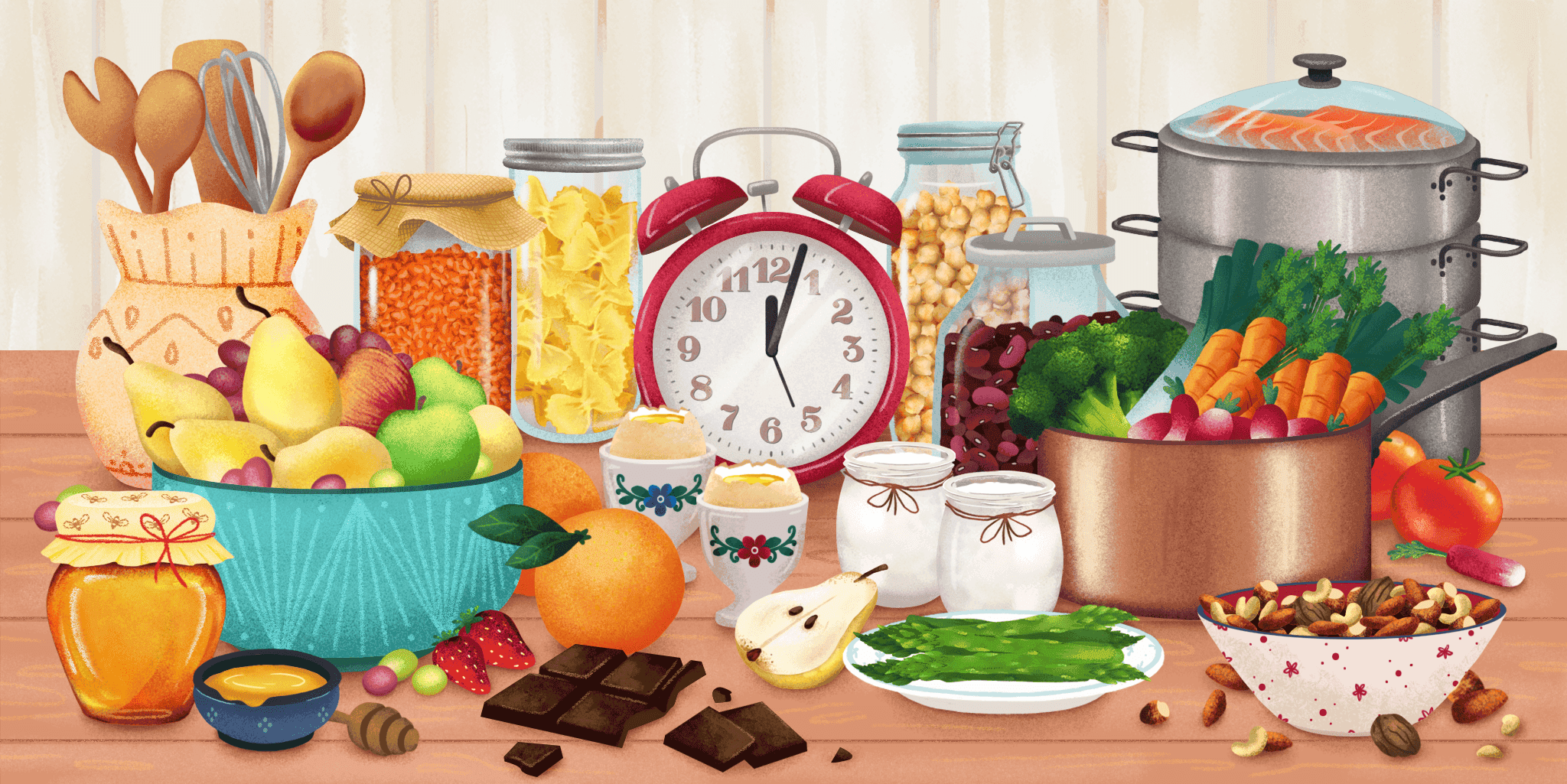
Nutrition is often regarded as the first form of medicine. Indeed, it plays a fundamental role in our health! This article presents 10 essential keys to adopting simple dietary habits that can optimize your health and well-being.
1. Have a savory breakfast!
Most of us eat cereal with milk or buttered white toast with jam alongside a tall glass of orange juice for breakfast. But that breakfast is far from ideal in terms of nutrition. Indeed, that kind of overly sugary meal encourages insulin secretion, which should be avoided — especially in the morning.
It’s best to opt for a savory breakfast. Eating protein in the morning promotes the production of dopamine, a neurotransmitter that stimulates the mind and jump-starts your motivation. In addition to making you more motivated and alert, consuming protein at breakfast can also help you feel full longer and reduce snacking later in the morning.
Eggs are the perfect solution because they contain extremely high quality protein and are rich in vitamins and minerals. But there are other protein sources you can try for variety:
 | Animal protein: one ounce of cheese (preferably goat or sheep milk), a yogurt (goat or sheep milk), sardines or a slice of good ham (from time to time) |
 | Plant-based protein: soy-based vegan pudding packed with protein, chia seeds, nuts (almonds, walnuts, hazelnuts, etc.) |
2. Eat at least 2 to 3 fruits and 2 to 3 servings of vegetables a day
A daily intake of 28 to 32 oz of fruit and vegetables is ideal, i.e. 2 to 3 servings of vegetables (17 oz) and 2 to 3 fruits. For lunch and dinner, choose at least one raw and one cooked fruit or vegetable.
After all, fresh fruits and vegetables are very high in fiber, which has an essential role to optimizing our health. It contributes to satiety and therefore plays an important role in weight management, it helps regulate our blood sugar levels, and it also facilitates digestion and helps balance our gut microbiota.
Fruits and vegetables are also rich in vitamins, minerals and antioxidants. Getting the right amount of antioxidants is particularly important for preventing cancer, degenerative diseases and cardiovascular disease.
Vary the fruits and vegetables on your plate and their colors as much as possible to reap all their benefits!
Warning: fruit juice is not the same as fruit! Juice lacks the fiber that regulates the rate at which sugars are assimilated, so its glycemic index is much higher than that of whole fruit.
3. Eat good fat
The quest to eliminate fat has no scientific or biological basis. In fact, “good fats” are responsible for the proper development of eyesight, brain membranes and neural connections. In addition to being good for the brain, they help reduce cardiovascular risks. So good fat is a crucial ally for good health!
But not all fats are created equal! The problem is not that we eat too much fat these days, but that we eat too much bad fat.
Limit your intake of saturated fats and omega-6, which are currently over-consumed. These fats are found in animal products (meat, butter, cheese, etc.), in some vegetable oils (sunflower, coconut, palm, grape seed) and above all in many processed products (cookies, potato chips, etc.).
On the other hand, make sure you get plenty of omega-3 fatty acids! Omega-3 fatty acids occur primarily in fatty fish (tuna, salmon, mackerel, sardines, etc.), certain oils (canola, linseed, walnut), seeds (chia, flax, hemp) and in some vegetables in very small quantities (watercress, lamb’s lettuce, cabbage). Caution: do not consume tuna or salmon more than once a week, as they generally contain high levels of various pollutants, including heavy metals (mercury, PCBs, dioxins, etc.).
Choose products rich in omega-9 fatty acids. Omega-9 fatty acids occur in large quantities in olive oil, hazelnut oil, avocado, hazelnuts and almonds. In view of the environmental impact of avocados, we recommend eating them only occasionally.
4. Take the time to chew
Chewing may seem like a trivial step and is often neglected; however, it plays an essential role in our health.
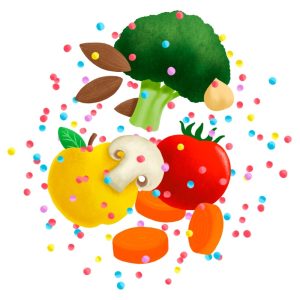 | Better nutrient absorption: good chewing transforms food into nutrients that reach our cells more effectively. |
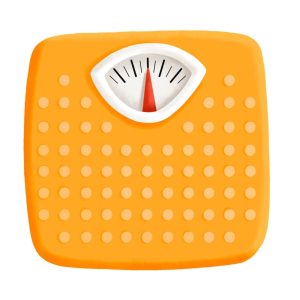 | Eating less and managing weight: chewing triggers various hormones that send a satiety signal to the brain during the meal. |
 | Improving digestion: insufficient chewing forces the stomach to produce more gastric juice to break down large pieces. This excess acid can irritate the digestive lining and cause acid reflux. |
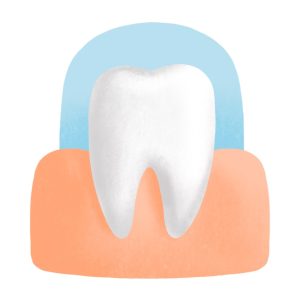 | Protecting teeth and gums: chewing helps prevent cavities by stimulating saliva production, which cleans dental plaque and protects enamel from acidity. It also exercises our gums, essential for good dental health. |
5. Fill up on antioxidants
Antioxidants are extremely beneficial molecules that are crucial to cell protection. They help guard against various afflictions, such as premature skin aging, cancer, degenerative disorders, cataracts, arthritis and cardiovascular disease.
The good news is that these miracle workers occur all around us in our food. Eating generous amounts of fruits and vegetables is usually enough to cover the body’s needs. Here are some foods with particularly high antioxidant properties:
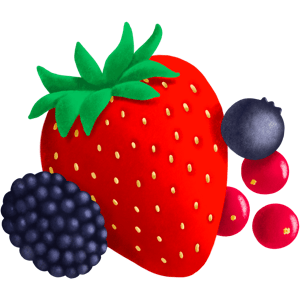 | Berries: blueberries, blackberries, goji berries, acai berries, raspberries, strawberries |
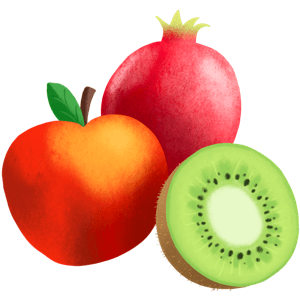 | Other fruits: apples, plums, pomegranates, oranges, kiwis, grapes, figs |
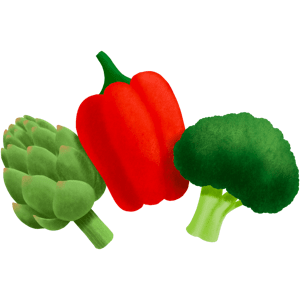 | Vegetables: artichokes, cabbages, broccoli, spinach, bell peppers |
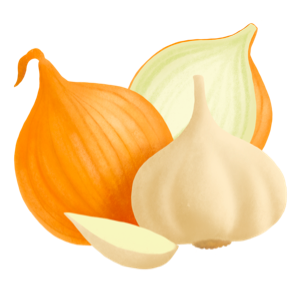 | Allium family: onion, garlic, shallot |
 | Spices: cloves, ginger, turmeric, cinnamon |
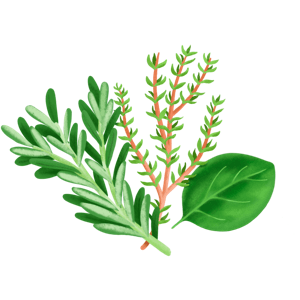 | Herb: thyme, basil, oregano, parsley, chives, dill, mint, rosemary, bay leaf |
 | Hot beverages: tea and coffee |
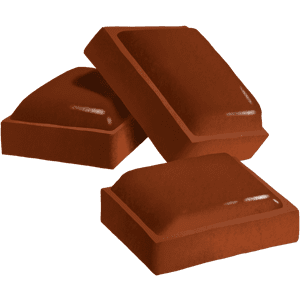 | Cacao and chocolate: pure cocoa powder, dark chocolate (at least 70% cacao) |
You should eat organic versions of these foods because organically grown foods have 20% to 70% more polyphenols (a type of antioxidant found in many vegetables) than conventionally grown foods.
6. Eat mindfully
In our busy lives, many of us eat breakfast at breakneck speed, or gobble up lunch in front of our computers to make the most of our time. We are completely disconnected from our relationship with food.
However, it is important to devote at least 20 minutes to each meal. Mindfulness is about considering a moment in its own right, and paying attention to what we eat.
Applying mindfulness to our eating habits will have several beneficial impacts. First, it enables us to listen to our hunger and satiety signals and ensure that our intake is adapted to our needs. This will reduce the quantities we consume and our cravings for snacks.
Mindful eating also helps develop a preference for healthier foods: when we eat impulsively and emotionally without listening to our bodies, we no longer feel the pleasure of eating, and we are more susceptible to fatty, sweet and salty foods.
Finally, mindfulness also contributes to mental well-being. It allows you to observe your feelings without judgment, and to listen to yourself. Thinking only of the present moment during a meal also helps to still the mind and lower stress and anxiety.
7. Limit your salt intake
Salt is essential to proper body function, but excessive consumption can lead to the development of certain diseases. Today, we consume more than twice as much salt than we really need!
Excessive salt intake increases the risk of high blood pressure. Hypertension itself can lead to heart disease and even stroke. Salt consumption also increases the risk of cancer and stomach ulcers.
There are simple ways to reduce salt intake:
- Limit foods high in salt: ready-made meals, potato chips, cold cuts, pizza, sauces, cheese, etc.
- Opt for alternatives to add flavor to dishes, such as garlic, onion, thyme, chives, basil, lemon, pepper, curry, paprika and all sorts of spices.
- Taste before salting
- Do not add salt to cooking water
- Remove the salt shaker from the table
8. Go vegetarian at dinner
It is recommended to prepare a vegetarian dinner, meaning no meat, fish or eggs. This type of meal will help pave the way for a good night’s sleep.
So, for dinner you should opt for plant-based protein rather than animal protein. Indeed, animal protein encourages the production of dopamine, a neurotransmitter responsible for alertness and motivation. While it is perfect in the morning to rev you up, at night the body needs to make serotonin, a neurotransmitter associated with soothing and sleep regulation.
Serotonin is made from tryptophan, an amino acid found in plant-based protein, such as legumes, soy, brown rice, sunflower seeds and chocolate. The carbohydrates found in legumes and grain products also help optimize serotonin production.
Some foods promote serotonin production, which optimizes sleep quality:
 | Walnuts and almonds: in addition to tryptophan, they contain magnesium, a lack of which can be linked to sleep disorders. |
 | Carbohydrates (from whole grains and fruits): thanks to insulin secretion, their amino acids will be directed to the brain rather than the muscles. That will make room for tryptophan in the brain, so it is more readily available for serotonin production. |
Furthermore, animal proteins and cooked fats are very demanding for the digestive system: they are made up of molecules that can take a long time to digest.
9. Opt for low-temperature cooking
Cooking at high temperatures erodes the nutritional quality of food: it leads to the destruction of certain vitamins and minerals. Some vitamins are very sensitive to heat, and foods can easily lose 50% of their initial vitamin content during cooking. The longer the cooking time and the higher the temperature, the lower the nutritional content of the food.
In addition, browning food during cooking is accompanied by the production of Maillard bodies, compounds which, in excessive quantities, can increase the risk of developing certain cancers.
Opt for low-temperature cooking, i.e. below 210°F. The most useful method is gently steaming your foods.
10. Eat raw foods and avoid processed foods
Raw food is a product that is sold in its original form and has not undergone any
processing: fruit and vegetables, legumes, eggs, fish, etc. Conversely, processed products
are those that have undergone some form of transformation in order to be sold and which do not occur in this form in nature: ready-made meals, fruit juices and soft drinks, cookies, etc.
Ultra-processed foods have problematic health effects: they are often low in nutrients with a high glycemic load. What’s more, they generally contain little fiber and their texture can be too soft to be satiating.
Finally, consuming processed foods throws the gut microbiota out of balance. As a result, the intestinal microbiota has fewer good bacteria, which are essential to proper body function since they fight pathogens (e.g. parasites and bacteria) and perform essential functions to prevent lifestyle diseases.
Here are some tips for avoiding processed foods:
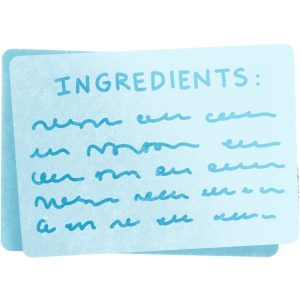 | Go with short ingredient lists, meaning no more than 4 or 5 ingredients. |
 | Avoid products whose ingredient list includes items with complicated names (glucose-fructose syrup, hydrolyzed proteins, modified starch, etc.). |
 | Choose products without problematic additives. Of course, you can use Yuka for this! |
 | Eat as many raw, unprocessed products as possible, that you have prepared and cooked yourself. |
- Hu FB, Stampfer MJ, Rimm EB et al. A prospective study of egg consumption and risk of cardiovascular disease in men and women. JAMA. 1999;281:1387-1394.
- Vorster HH, Benade AJ, Barnard HC et al. Egg intake does not change plasma lipoprotein and coagulation profiles. Am J Clin Nutr. 1992;55:400-410.
- Katz DL, Evans MA, Nawaz H et al. Egg consumption and endothelial function: a randomized controlled crossover trial. Int J Cardiol. 2005;99:65-70.
- Howell WH, McNamara DJ et al. Plasma lipid and lipoprotein responses to dietary fat and cholesterol: a meta-analysis. Am J Clin Nutr. 1997;65:1747-1764.
- Krauss RM, Eckel RH, Howard B et al. AHA Dietary Guidelines: revision 2000: A statement for healthcare professionals from the Nutrition Committee of the American Heart Association. Stroke. 2000;31:2751-2766.
- Swanson D, Block R, Mousa SA. Omega-3 fatty acids EPA and DHA: health benefits throughout life. Adv Nutr. 2012 Jan;3(1):1-7. doi: 10.3945/an.111.000893. Epub 2012 Jan 5. Review.
- Nichols PD, McManus A, Krail K, Sinclair AJ, Miller M. Recent advances in omega-3: Health Benefits, Sources, Products and Bioavailability. Nutrients. 2014;6(9):3727–3733. Published 2014 Sep 16.
- Étude individuelle nationale des consommations alimentaires 3 (INCA 3) – Avis de l’Anses – Rapport d’expertise collective.
- Delgado GE, Krämer BK, Lorkowski S, März W, von Schacky C, Kleber ME. Individual omega-9 monounsaturated fatty acids and mortality-The Ludwigshafen Risk and Cardiovascular Health Study. J Clin Lipidol. 2017 Jan – Feb;11(1):126-135.e5
- Flood-Obbagy, J. E.; Rolls, B. J. The Effect of Fruit in Different Forms on Energy Intake and Satiety at a Meal. Appetite 2009, 52 (2), 416–422.
- Dagfinn Aune, Edward Giovannucci, Paolo Boffetta, Lars T. Fadnes, NaNa Keum, Teresa Norat, Darren C. Greenwood, Elio Riboli, Lars J. Vatten, Serena Tonstad. Fruit and vegetable intake and the risk of cardiovascular disease, total cancer and all-cause mortality–a systematic review and dose-response meta-analysis of prospective studies. International Journal of Epidemiology, 2017; DOI: 10.1093/ije/dyw319
- Tavoularis G., Hébel P., «Fruits et légumes : les Français suivent de moins en moins la recommandation», in: Consommations et modes de vies, CREDOC, n°292, ISSN 0295-9976, Juillet 2017
- Etude NutriNet-Sante : https://info.etude-nutrinet-sante.fr/protectednew/pdf/DOSSIER_PRESSE_Nutrinet-Sante_22_11_12.pdf
- Feder D, Fonseca FLA. Chapter 2 – The Mechanism of Fiber Effects on Insulin Resistance. In: Samaan RA, ed. Dietary Fiber for the Prevention of Cardiovascular Disease. Academic Press; 2017:23-33.
- Patel S. Anti-Obesity and Anti-Diabetes Foods: High Fibre Diets. In: Melton L, Shahidi F, Varelis P, eds. Encyclopedia of Food Chemistry. Oxford: Academic Press; 2019:248-252.
- De Vadder F, Kovatcheva-Datchary P, Goncalves D, Vinera J, Zitoun C, Duchampt A, Bäckhed F, Mithieux G. Microbiota-generated metabolites promote metabolic benefits via gut-brain neural circuits. Cell. 2014 Jan 16;156(1-2):84-96.
- Threapleton DE, Greenwood DC, Evans CE, Cleghorn CL, Nykjaer C, Woodhead C, Cade JE, Gale CP, Burley VJ. Dietary fibre intake and risk of cardiovascular disease: systematic review and meta-analysis. BMJ. 2013 Dec 19;347:f6879.
- Imai S, Fukui M, Kajiyama S. Effect of eating vegetables before carbohydrates on glucose excursions in patients with type 2 diabetes. J Clin Biochem Nutr. 2014 Jan;54(1):7-11.
- BROWNLEE, Iain A., CHATER, Peter I., PEARSON, Jeff P., et al. Dietary fibre and weight loss: Where are we now?. Food Hydrocolloids, 2017, vol. 68, p. 186-191.
- Chandalia M, Garg A, Lutjohann D, von Bergmann K, Grundy SM, Brinkley LJ.
- Beneficial effects of high dietary fiber intake in patients with type 2 diabetes mellitus. N Engl J Med. 2000 May 11;342(19):1392-8.
- Kim Y, Je Y. Dietary fibre intake and mortality from cardiovascular disease and all cancers: A meta-analysis of prospective cohort studies. Arch Cardiovasc Dis. 2016 Jan;109(1):39-54.
- Siri-Tarino, P. W., Sun, Q., Hu, F. B., & Krauss, R. M. (2010). Saturated fat, carbohydrate, and cardiovascular disease. The American journal of clinical nutrition, 91(3), 502-509.
- DiNicolantonio JJ, Lucan SC, O’Keefe JH. The Evidence for Saturated Fat and for Sugar Related to Coronary Heart Disease. Prog Cardiovasc Dis. 2016 Mar-Apr;58(5):464-72. doi: 10.1016/j.pcad.2015.11.006. Epub 2015 Nov 14. Review.
- Patterson E, Wall R, Fitzgerald GF, Ross RP, Stanton C. Health implications of high dietary omega-6 polyunsaturated Fatty acids. J Nutr Metab. 2012;2012:539426.
- Innes JK, Calder PC. Omega-6 fatty acids and inflammation. Prostaglandins Leukot Essent Fatty Acids. 2018 May;132:41-48. doi: 10.1016/j.plefa.2018.03.004. Epub 2018 Mar 22. Review.
- Simopoulos AP. The importance of the ratio of omega-6/omega-3 essential fatty acids. Biomed Pharmacother. 2002 Oct;56(8):365-79. Review. PubMed PMID: 12442909.
- Simopoulos AP. An Increase in the Omega-6/Omega-3 Fatty Acid Ratio Increases the Risk for Obesity. Nutrients. 2016;8(3):128. Published 2016 Mar 2.
- DiNicolantonio JJ, O’Keefe JH. Importance of maintaining a low omega-6/omega-3 ratio for reducing inflammation. Open Heart. 2018;5(2):e000946. Published 2018 Nov 26.
- de Lorgeril M, Salen P. New insights into the health effects of dietary saturated and omega-6 and omega-3 polyunsaturated fatty acids. BMC Med. 2012;10:50. Published 2012 May 21.
- Bernard, Carole & Vanduffel, Steven & Ye, Jiang, 2019. « Optimal strategies under Omega ratio, » European Journal of Operational Research, Elsevier, vol. 275(2), pages 755-767.
- Dhaka V, Gulia N, Ahlawat KS, Khatkar BS. Trans fats-sources, health risks and alternative approach – A review. J Food Sci Technol. 2011;48(5):534–541.
- Iqbal MP. Trans fatty acids – A risk factor for cardiovascular disease. Pak J Med Sci. 2014;30(1):194–197.
- Mozaffarian D, Aro A, Willett WC. Health effects of trans-fatty acids: experimental and observational evidence. Eur J Clin Nutr. 2009 May;63 Suppl 2:S5-21.
- Shah B, Thadani U. Trans fatty acids linked to myocardial infarction and stroke: What is the evidence? Trends Cardiovasc Med. 2019 Jul;29(5):306-310. doi: 10.1016/j.tcm.2018.09.011. Epub 2018 Sep 19. Review. PubMed PMID: 31130187.
- Okubo H, Murakami K, Masayasu S, Sasaki S. The Relationship of Eating Rate and Degree of Chewing to Body Weight Status among Preschool Children in Japan: A Nationwide Cross-Sectional Study. Nutrients. 2018;11(1):64. Published 2018 Dec 29.
- Zhu Y, Hollis JH. Relationship between chewing behavior and body weight status in fully dentate healthy adults. Int J Food Sci Nutr. 2015 Mar;66(2):135-9.
- Ashiga H, Takei E, Magara J, et al. Effect of attention on chewing and swallowing behaviors in healthy humans. Sci Rep. 2019;9(1):6013. Published 2019 Apr 12.
- N’gom PI, Woda A. Influence of impaired mastication on nutrition. J Prosthet Dent. 2002;87(6):667-673.
- Mann T, Heuberger R, Wong H. The association between chewing and swallowing difficulties and nutritional status in older adults. Aust Dent J. 2013;58(2):200-206.
- Furuta M, Yamashita Y. Oral Health and Swallowing Problems. Curr Phys Med Rehabil Rep. 2013;1(4):216-222. Published 2013 Sep 15.
- Furuta M, Komiya-Nonaka M, Akifusa S, Shimazaki Y, Adachi M, Kinoshita T, Kikutani T, Yamashita Y. Interrelationship of oral health status, swallowing function, nutritional status, and cognitive ability with activities of daily living in Japanese elderly people receiving home care services due to physical disabilities. Community Dent Oral Epidemiol. 2013 Apr;41(2):173-81.
- Miquel-Kergoat S, Azais-Braesco V, Burton-Freeman B, Hetherington MM. Effects of chewing on appetite, food intake and gut hormones: A systematic review and meta-analysis. Physiol Behav. 2015 Nov 1;151:88-96.
- Crinnion WJ. Organic foods contain higher levels of certain nutrients, lower levels of pesticides, and may provide health benefits for the consumer. Altern Med Rev. 2010 Apr;15(1):4-12. Review.
- Barański M, Srednicka-Tober D, Volakakis N, Seal C, Sanderson R, Stewart GB, Benbrook C, Biavati B, Markellou E, Giotis C, Gromadzka-Ostrowska J, Rembiałkowska E, Skwarło-Sońta K, Tahvonen R, Janovská D, Niggli U, Nicot P, Leifert C. Higher antioxidant and lower cadmium concentrations and lower incidence of pesticide residues in organically grown crops: a systematic literature review and meta-analyses. Br J Nutr. 2014 Sep 14;112(5):794-811.
- https://presse.inserm.fr/moins-de-cancers-chez-les-consommateurs-daliments-bio/32820/
- Morillo Sarto H, Barcelo-Soler A, Herrera-Mercadal P, et al. Efficacy of a mindful-eating programme to reduce emotional eating in patients suffering from overweight or obesity in primary care settings: a cluster-randomised trial protocol. BMJ Open. 2019;9(11):e031327. Published 2019 Nov 21.
- Mantzios M. Editorial: Mindfulness and Eating Behavior. Front Psychol. 2018;9:1986. Published 2018 Oct 12.
- O’Reilly GA, Cook L, Spruijt-Metz D, Black DS. Mindfulness-based interventions for obesity-related eating behaviours: a literature review. Obes Rev. 2014;15(6):453-461.
- Warren JM, Smith N, Ashwell M. A structured literature review on the role of mindfulness, mindful eating and intuitive eating in changing eating behaviours: effectiveness and associated potential mechanisms. Nutr Res Rev. 2017;30(2):272-283.
- Godfrey KM, Gallo LC, Afari N. Mindfulness-based interventions for binge eating: a systematic review and meta-analysis. J Behav Med. 2015;38(2):348-362.
- Friedman M. Analysis, Nutrition, and Health Benefits of Tryptophan. Int J Tryptophan Res. 2018;11:1178646918802282. Published 2018 Sep 26.
- Jenkins TA, Nguyen JC, Polglaze KE, Bertrand PP. Influence of Tryptophan and Serotonin on Mood and Cognition with a Possible Role of the Gut-Brain Axis. Nutrients. 2016;8(1):56. Published 2016 Jan 20.
- Troynikov O, Watson CG, Nawaz N. Sleep environments and sleep physiology: A review. J Therm Biol. 2018 Dec;78:192-203.
- Tavoularis G., Hébel P., «Fruits et légumes : les Français suivent de moins en moins la recommandation», in: Consommations et modes de vies, CREDOC, n°292, ISSN 0295-9976, Juillet 2017
- Aune et al, Dietary fibre, whole grains, and risk of colorectal cancer: systematic review and dose-response meta-analysis of prospective studies. BMJ 2011.
- Ötles et Ozgoz. 2014. « Health effects of dietary fiber ». Acta Sci Pol, Tech Aliment 191-202.
- Y. Zhu, W. Ling, H. Guo, F. Song, Q. Ye, T. Zou, D. Li, Y. Zhang, G. Li, Y. Xiao, F. Liu, Z. Li, Z. Shi, Y. Yang. Anti-inflammatory effect of purified dietary anthocyanin in adults with hypercholesterolemia: A randomized controlled trial. Nutrition, Metabolism and Cardiovascular Diseases, Available online 17 August 2012, ISSN 0939-4753, 10.1016/j.numecd.2012.06.005.
- Lee S, Choi Y, Jeong HS, Lee J, Sung J. Effect of different cooking methods on the content of vitamins and true retention in selected vegetables. Food Sci Biotechnol. 2017;27(2):333-342. Published 2017 Dec 12.
- Jiménez-Monreal AM, García-Diz L, Martínez-Tomé M, Mariscal M, Murcia MA. Influence of cooking methods on antioxidant activity of vegetables. J Food Sci. 2009;74(3):H97-H103.
- Yuan GF, Sun B, Yuan J, Wang QM. Effects of different cooking methods on health-promoting compounds of broccoli. J Zhejiang Univ Sci B. 2009;10(8):580-588.
- Bastías JM, Balladares P, Acuña S, Quevedo R, Muñoz O. Determining the effect of different cooking methods on the nutritional composition of salmon (Salmo salar) and chilean jack mackerel (Trachurus murphyi) fillets. PLoS One. 2017;12(7):e0180993. Published 2017 Jul 7.
- Andlauer W, Stumpf C, Hubert M, Rings A, Fürst P. Influence of cooking process on phenolic marker compounds of vegetables. Int J Vitam Nutr Res. 2003;73(2):152-159.
- Ferracane R, Pellegrini N, Visconti A, et al. Effects of different cooking methods on antioxidant profile, antioxidant capacity, and physical characteristics of artichoke. J Agric Food Chem. 2008;56(18):8601-8608.
- Carcinogens in Tobacco Smoke: Benzo[a] pyrene from Canadian Cigarettes and Cigarette Tobacco, M.J.Kaisennan, W. S.Rickert, American Journal of Public Health, 1992
- Analysis of 200 food items for benzo[a] pyrene and estimation of its intake in an epidemiologic study, N.Kazerounia et al, Food and Chemical Toxicology 39, 2000
- EFSA – https://www.efsa.europa.eu/fr/efsajournal/pub/4104
- INFOSAN – https://www.who.int/foodsafety/fs_management/No_02_Acrylamide_Mar05_fr_rev1.pdf
- Anses – L’acrylamide dans les aliments : https://www.anses.fr/fr/content/l%E2%80%99acrylamide-dans-les-aliments
- Parada H Jr, Steck SE, Bradshaw PT, et al. Grilled, Barbecued, and Smoked Meat Intake and Survival Following Breast Cancer. J Natl Cancer Inst. 2017;109(6):djw299. Published 2017 Jan 5.
- Uribarri J, Woodruff S, Goodman S, et al. Advanced glycation end products in foods and a practical guide to their reduction in the diet. J Am Diet Assoc. 2010;110(6):911-16.e12.
- Tamanna N, Mahmood N. Food Processing and Maillard Reaction Products: Effect on Human Health and Nutrition. Int J Food Sci. 2015;2015:526762.
- Trevisan AJ, de Almeida Lima D, Sampaio GR, Soares RA, Markowicz Bastos DH. Influence of home cooking conditions on Maillard reaction products in beef. Food Chem.
- Virk-Baker MK, Nagy TR, Barnes S, Groopman J. Dietary acrylamide and human cancer: a systematic review of literature. Nutr Cancer. 2014;66(5):774-790.
- Brownlee M. Advanced protein glycosylation in diabetes and aging. Annu Rev Med. 1995;46:223-234.
- Anne Moorhead, S.; Welch, R. W.; Barbara, M.; Livingstone, E.; McCourt, M.; Burns, A. A.; Dunne, A. The Effects of the Fibre Content and Physical Structure of Carrots on Satiety and Subsequent Intakes When Eaten as Part of a Mixed Meal. Br. J. Nutr. 2006, 96 (3), 587–595.
- Haber, G. B.; Heaton, K. W.; Murphy, D.; Burroughs, L. F. Depletion and Disruption of Dietary Fibre. Effects on Satiety, Plasma-Glucose, and Serum-Insulin. Lancet 1977, 2 (8040), 679–682.
- Flood-Obbagy, J. E.; Rolls, B. J. The Effect of Fruit in Different Forms on Energy Intake and Satiety at a Meal. Appetite 2009, 52 (2), 416–422.
- Gustafsson, K.; Asp, N. G.; Hagander, B.; Nyman, M.; Schweizer, T. Influence of Processing and Cooking of Carrots in Mixed Meals on Satiety, Glucose and Hormonal Response. Int J Food Sci Nutr 1995, 46 (1), 3–12.
- Lioger, D.; Fardet, A.; Foassert, P.; Davicco, M.-J.; Mardon, J.; Gaillard-Martinie, B.; Remesy, C. Influence of Sourdough Prefermentation, of Steam Cooking Suppression and of Decreased Sucrose Content during Wheat Flakes Processing on the Plasma Glucose and Insulin Responses and Satiety of Healthy Subjects. J Am Coll Nutr 2009, 28 (1), 30–36.
- Burton, P.; Lightowler, H. J. Influence of Bread Volume on Glycaemic Response and Satiety. Br. J. Nutr. 2006, 96 (5), 877–882.
- Bligh, H. F. J.; Godsland, I. F.; Frost, G.; Hunter, K. J.; Murray, P.; MacAulay, K.; Hyliands, D.; Talbot, D. C. S.; Casey, J.; Mulder, T. P. J.; et al. Plant-Rich Mixed Meals Based on Palaeolithic Diet Principles Have a Dramatic Impact on Incretin, Peptide YY and Satiety Response, but Show Little Effect on Glucose and Insulin Homeostasis: An Acute-Effects Randomised Study. Br. J. Nutr. 2015, 113 (4), 574–584.
- Bleiweiss-Sande, R.; Chui, K.; Evans, E. W.; Goldberg, J.; Amin, S.; Sacheck, J. Robustness of Food Processing Classification Systems. Nutrients 2019, 11 (6).
- Fardet, A.; Rock, E. Perspective: Reductionist Nutrition Research Has Meaning Only within the Framework of Holistic and Ethical Thinking. Adv Nutr 2018, 9 (6), 655–670.
- Louzada, M. L. da C.; Ricardo, C. Z.; Steele, E. M.; Levy, R. B.; Cannon, G.; Monteiro, C. A. The Share of Ultra-Processed Foods Determines the Overall Nutritional Quality of Diets in Brazil. Public Health Nutr 2018, 21 (1), 94–102.
- Moubarac JC, Batal M, Louzada ML, Martinez Steele E, Monteiro CA. Consumption of ultra-processed foods predicts diet quality in Canada. Appetite. 2017;108:512-520.
- Rauber, F.; Louzada, M. L. da C.; Steele, E. M.; Millett, C.; Monteiro, C. A.; Levy, R. B. Ultra-Processed Food Consumption and Chronic Non-Communicable Diseases-Related Dietary Nutrient Profile in the UK (2008–2014). Nutrients 2018, 10 (5).
- Machado, P. P.; Steele, E. M.; Levy, R. B.; Sui, Z.; Rangan, A.; Woods, J.; Gill, T.; Scrinis, G.; Monteiro, C. A. Ultra-Processed Foods and Recommended Intake Levels of Nutrients Linked to Non-Communicable Diseases in Australia: Evidence from a Nationally Representative Cross-Sectional Study. BMJ Open 2019, 9 (8), e029544.
- Martínez Steele E, Popkin BM, Swinburn B, Monteiro CA. The share of ultra-processed foods and the overall nutritional quality of diets in the US: evidence from a nationally representative cross-sectional study. Popul Health Metr. 2017;15(1):6. Published 2017 Feb 14.
- Fardet, A. Characterization of the Degree of Food Processing in Relation With Its Health Potential and Effects. Adv. Food Nutr. Res. 2018, 85, 79–129.
- Costa, C. S.; Del-Ponte, B.; Assunção, M. C. F.; Santos, I. S. Consumption of Ultra-Processed Foods and Body Fat during Childhood and Adolescence: A Systematic Review. Public Health Nutr 2018, 21 (1), 148–159.
- Srour B, Fezeu LK, Kesse-Guyot E, et al. Ultra-processed food intake and risk of cardiovascular disease: prospective cohort study (NutriNet-Santé). BMJ. 2019;365:l1451. Published 2019 May 29.
- Costa, C. S.; Del-Ponte, B.; Assunção, M. C. F.; Santos, I. S. Consumption of Ultra-Processed Foods and Body Fat during Childhood and Adolescence: A Systematic Review. Public Health Nutr 2018, 21 (1), 148–159.
- Hall KD, Ayuketah A, Brychta R, et al. Ultra-Processed Diets Cause Excess Calorie Intake and Weight Gain: An Inpatient Randomized Controlled Trial of Ad Libitum Food Intake [published correction appears in Cell Metab. 2019 Jul 2;30(1):226]. Cell Metab. 2019;30(1):67-77.e3.
- Vandevijvere, S.; Jaacks, L. M.; Monteiro, C. A.; Moubarac, J.-C.; Girling-Butcher, M.; Lee, A. C.; Pan, A.; Bentham, J.; Swinburn, B. Global Trends in Ultraprocessed Food and Drink Product Sales and Their Association with Adult Body Mass Index Trajectories. Obes Rev 2019, 20 Suppl 2, 10–19.
- Nardocci, M.; Leclerc, B.-S.; Louzada, M.-L.; Monteiro, C. A.; Batal, M.; Moubarac, J.-C. Consumption of Ultra-Processed Foods and Obesity in Canada. Can J Public Health 2019, 110 (1), 4–14
- Chambers, Lucy. (2016). Food texture and the satiety cascade. Nutrition Bulletin. 41. 277-282. 10.1111/nbu.12221.
- Tremblay, A.; Bellisle, F. Nutrients, Satiety, and Control of Energy Intake. Appl Physiol Nutr Metab 2015, 40 (10), 971–979.
- Fardet, A. Minimally Processed Foods Are More Satiating and Less Hyperglycemic than Ultra-Processed Foods: A Preliminary Study with 98 Ready-to-Eat Foods. Food Funct 2016, 7 (5), 2338–2346.
- Fiolet, T.; Srour, B.; Sellem, L.; Kesse-Guyot, E.; Allès, B.; Méjean, C.; Deschasaux, M.; Fassier, P.; Latino-Martel, P.; Beslay, M.; et al. Consumption of Ultra-Processed Foods and Cancer Risk: Results from NutriNet-Santé Prospective Cohort. BMJ 2018, 360.
- Zinöcker, M. K.; Lindseth, I. A. The Western Diet–Microbiome-Host Interaction and Its Role in Metabolic Disease. Nutrients 2018, 10 (3).







As a diabetes professional, this article closely resembles the information I give to my clients. The App is amazing and gives enough information to be able to make a good informed decision
Your article was spot on. Over the years as I’ve studied good nutrition, all of what you’ve been talking about has been promoted over and over again by science and research. Please keep up your articles and include some healthy recipes.
Excellent article. Very easy to read and thought provoking
My friend told me about your app and I followed know for better food
Bloody good article
Great advice
My husband and I use the app very often for foods that we should be eating and those we should not
My daughter installed your app on my phone, I use it all the time. I have shared its use, now three friends use it.
Excellent been doing this for years keep the weight off works out cheaper my tip my bean casserole all types bean butter beans black beans,add leaks carrot sweet spuds,and you can freeze portions i can six good portions to freeze its my foundation dish works out cheap as chips
Great information!
I use my Yuka app for everything I buy. Love it!!!!
Great article thank you
Thank You for the above link that appears to me that you are sharing much good information that I know so little about, however I am willing to learn!
Very helpful information. I like these healthy food . Thanks for sharing.
Accolades 👏👏👏, very inspiring, engaging, informative, interesting and time well spent reading this wonderful article, beautiful, my friend introduced Yuka app to me couple of days ago, it’s really helpful when it comes to checking things that we use and that we consume of how good or dangerous they are to our bodies
Thank you
Great app and article. Agree with low temp cooking – can you give me some examples of how high temp cooking “damages” minerals….? Cheers Greg
This is a good article. I’m definitely going to stop eating meat for dinner. And, I will eat larger meals in the morning along with encouraging myself and others not to drink juice. I did want to know if eating sea salt was okay
Great article, focuses on people’s health rather than advertising the app (which is very handy by the way). For your next healthy habits article, consider adding sections for vegetarian/vegan people. A a vegan, your dinner recommendation certainly resonated 🙂
Really interesting reading. Not only does it inform me, it is motivational at the same time. This is the first article I have read from Yuka as I’m new to the app. I am really happy I have added Yuka to my plan to get healthier. Thank you so much.
Great advice! I’ve used the Yuka app for several years!
One of the few emails I receive and read! Great information to build on what most of us already know but solidified with great additional insight.
Since i’ve got this app, I love it, then I hate it too.The reason for that is everything that I like.I can’t eat no more.But that’s okay.But I do love this app, and I tell everybody about it.I’m not paying the yearly fee, but i’m still thinking about it.I’m still checking this out.And I like to see what else options I would get if I did sign up
I feel the same it’s mostly everything I like the vegan food And vegan cheese and oat milk
Thank you
Very good info can really help. I had a major bowel op last year and need to be very careful in what I eat. These articles help a lot.
Very educative and insightful piece. Thank you
Enjoyed the article, a refresh, along with new information!
Therese
Love this article… however it needs more examples of foods to eat in all categories to get naturally higher doses of vitamin and minerals. Also please include more articles about “the eat vegetarian food at dinner to sleep better”.
Loved the article. Thanks, just the right length and clear but not punitive.
Pam van Zandt
Thankyou Julie for bringing this article to the forefront . I’ve read it and I feel I have a much better understanding of what is best for me, and what foods I will eat .👍👍👍. Thankyou very much Anthony for sharing your expert knowledge on food consumption and what and why these foods are best for you. I feel much more confident now in my choices of foods to eat . And I love my Yuka app…. I use it always when at the store .
The environmental impact of avocados – despite their ‘specific requirements’ is still far less than animal farming, yet you advice people to regularly consume meat and fish……. : ( 🤔
Thank you for this informative, well-written article! I learned it’s better to cook at low temps (point #9), and was also surprised to learn some canola oils contain good Omega-3 oils, and wondered which brands are best.
Thanks again! I will share this great info with family members and friends!
Plant protein is WAAAY healthier than animal protein, and HAM is a class 1 carcinogen, surprised you would recommend that for breakfast!
I’m new to yuka. Thanks for the article. I plan to start making changes in my eating. My main problem is I’m a picky eater. Keep sending articles.
This was very interesting. Full of useful ideas
Great advice! Thank you.
I have supported the Yuka app for a few years and only now realized there are articles as well. Could sit here all day reading and learning. Love the work you are doing.
Thank you so much for this comprehensive and informative article. I have made so many changes to the type of foods and cosmetics that I use.
God bless you and your business.
I have studied nutrition in college and followed basic principles my whole life. So I believe in all you have put in this article and practiced and used.
I would like to know what you have found as the best vegetable oil for salads and cooking, aside from olive oil (which is always in my kitchen). Thank you
I love Yuka it is so informative
Tanks Julie ,
Lots of good info! a lot to take away from the table , a few things I may not side with , but! a well put togeather informative article worth the read .👍👍👍.
Regards ……………………….. Bear
Great comprehensive article.
I’m new to the app and had a kidney transplant 3.5 yrs ago. I’m doing great while on this journey and I’m loving the learning process with a beginners mindset. I love this stuff and I’m diving in head first.
Love the app and the article is very informative and helping me to level up on my nutrition. 👍🏼
Great information! I like the fact it is simple and straightforward without selling something or ads! Information to trust. Love the app!
Thank you so much for this very comprehensive and informative article. I have made so many changes since using your app. I will sign up to contribute to your continuing success.
Love the app, use it frequently whilst food shopping to try to get the best, healthiest product. Thank you for your interesting and informative articles.
Thank you very educational this will helps me when i go shopping
Thank you all , for this wonderful opportunity to look at my shopping list and nutrition very differently ,an amazing new opportunity to see the real value of food.
Thanks, love the tips
Many thanks for this article I have found it very interesting. My husband & I are both using the Yuka app & are making some changes
Great article!! Thank you 👍
Great article. Lots of valuable information which is going to help me with changing my diet by limiting processed foods, looking at ingredients on packages and making more healthy choices. Thank you.
Savoury breakfast – agree!
Veggie dinner – agree!
What about lunch? Not mentioned.
Thankyou
Very good invaluable thanks s
Salmon is often recommended as great for healthy eating but salmon produced in Australia is farmed and that is not healthy.
I’m a new user of this app but have eaten a Paleo plan for over 15 years.
I’m loving the easy use of the scan product and it’s teaching me many useful tips.
It’s helping me to tweak my eating habits and I’m now using it part of my daily routine.
I’ve recommended it to all my friends, we are all in our 50s and consider our health very very important.
Thank you Yuka
Brilliant app and it’s free, amazing
I’m so grateful to have found this app. I’ve used it to help me bring my cholesterol down from 6.8 to 5.9. My doctor suggested I go on cholesterol tablets but thanks to keeping an eye on my saturated fats intake, I’ve been able to avoid medication. It’s been a real game changer for me. Thanks Yuka!